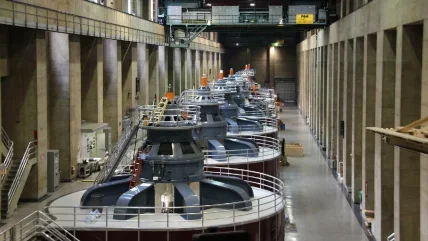
On 31 October, the great and the good of hydropower and the renewables sector will be gathering in Bali to take part in the World Hydropower Congress under the theme ‘Powering Sustainable Growth’. Key decision-makers will join energy experts, and industry leaders along with 1500 participants to help supercharge the growth of sustainable hydropower. Confirmed speakers include Malcolm Turnbull (former Australian Prime Minister and pumped storage champion); Erik Solheim (environmentalist and former UN Under Secretary-General); Abang Haji Abdul Rahman Zohari Tun Abang Hj Openg (Premier of Sarawak, Malaysia); Arifin Tasrif (Minister of Energy and Mineral Resources Indonesia), Nikolay Podguzov (President of Eurasian Development Bank); and Indonesian hydropower trailblazer Tri Mumpuni Executive Director of IBEKA; with many others due to be announced in the coming weeks.
The Indonesian Government will host the congress as part of the official ASEAN Chairmanship programme. It will take place between the G20 Summit and COP28 as part of a drumbeat of sustainable hydropower advocacy events focused on sustainable hydropower development through financial and market mechanisms that reward flexibility, accelerating the development of renewables through streamlined permitting and licensing, and embedding hydropower sustainability practices in government regulation.
On holding Congress in Indonesia, IHA Chief Executive Eddie Rich said: “Indonesia has demonstrated strong leadership and commitment to the sustainable energy transition, including plans to use its vast potential of hydropower and other renewables to drive its economic development. Its Energy Sector Roadmap to Net Zero Emissions is perfectly aligned with the Congress’s theme of Powering Sustainable Growth. And I’d like to thank the Indonesian Government and PLN in advance for their hospitality and their support for this event.”
Opportunities in Indonesia
Under the leadership of President Joko Widodo, the Government of Indonesia has set out an ambitious path for growth through renewables. Reducing its dependence on coal and fossil fuels is part of this plan. Indonesia has committed to cut its emissions by 32% by 2030 and plans to reach net-zero by 2060.
Hydropower is key to the success of this strategy. Indonesia’s doors are wide open and they are eager to continue conversations that began at the G20 in Bali in November 2022. With engagement in mind, they will host the ASEAN Summit in Sept 2023, the World Hydropower Congress in October 2023 and the World Water Forum in May 2024.
The present administration completes its term in Feb 2024 having established a ‘Renewables Based Industrial Strategy’ as a significant element of their legacy. The strategy focuses on the world’s largest green industrial park to be built in North Kalimantan which, once built, will draw on up to 7GW of hydropower. This project is gaining interest from international developers, construction, manufacturers, and consultants, both from within and beyond IHA membership.
Future potential
Indonesia has big clean energy plans with an ambitious target to have 10GW of hydropower capacity by 2030 from the current 6.6GW. There are 61 dams within their development plan for construction by 2025 but there will still be a gap of 11.5GW needed to achieve their 20.8GW target for renewable energy by 2025.
Indonesia has a growing interest in floating solar PVs with 145MW currently in progress. There is significant potential for floating solar (FPV) in Indonesia and particularly in Java. FPV opportunities include 145MW on Cirata’s reservoir and 400MW potential on Jatiluhur’s reservoir.
Case Study
Kusan is a multipurpose dam in South Kalimantan currently under assessment using the Hydropower Sustainability Standard. Over the last few months, the IHA Sustainability Team has been working closely with the Indonesian Ministry of National Development Planning (Bappenas) and the local regency government of Tanah Bumbu to improve the feasibility of the project’s development and preparation. Services planned for the project include irrigation, water supply, flood control and 41MW of hydropower. The assessment will lead to an action plan, which, if implemented, will help attract climate-aligned finance to the project and international donors through public private partnerships or an independent power producer model.
Ahead of the on-site inspection in November 2022, local and national government representatives joined a training session for certified users in Jakarta to better understand the standard requirements and prepare themselves for the assessment process. The assessment was conducted by independent accredited lead assessor Joerg Hartmann with the support of a team of national assessors. The final report will be translated into Bahasa Indonesian and shared with local actors and affected communities for their input.
These activities are part of a wider capacity building programme in Indonesia supported by the Swiss State Secretariat for Economic Affairs (SECO) which includes the recent assessment of the Jatiluhur Dam in Java and an accreditation training held in London. The Kusan assessment was co-financed by the Hydropower Sustainability ESG (HESG) Fund, an initiative also funded by SECO and managed by IHA’s Sustainability Team.
To find out more about the event visit: https://www.worldhydropowercongress.org/.






